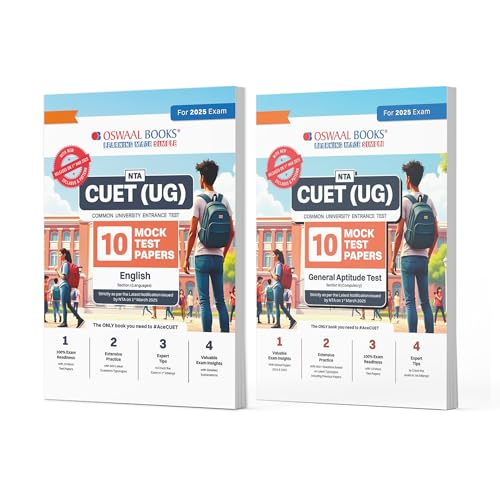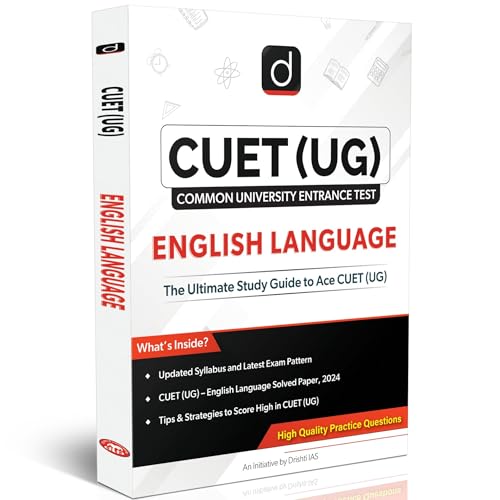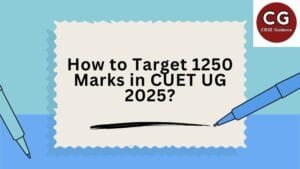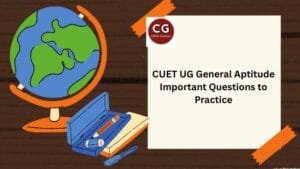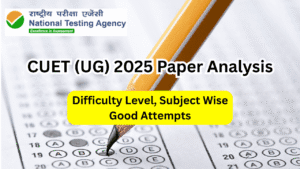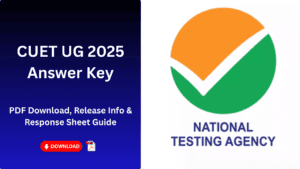The CUET UG English Test 2025, part of Section IA (Language) in the Common University Entrance Test (CUET), is essential for candidates aiming for undergraduate programs requiring strong language skills. This section tests Reading Comprehension (Factual, Narrative, Literary passages) and Verbal Ability (sentence rearrangement, matching, synonyms/antonyms, choosing the correct word).
Below are some important MCQs based on the CUET UG 2025 English syllabus and patterns from Previous Year Questions (PYQ). These cover key areas to help you practice effectively. Each question includes answers and explanations to build your skills. Practice these to master the test’s difficulty and format.
Reading Comprehension Questions
This section includes passages (up to 300 words) of Factual, Narrative, and Literary types, testing understanding, inference, and vocabulary, as seen in PYQ.
Factual Passage
Passage: Coffee is a global commodity, with 10 million tonnes sold in 2022–23. Two main species, Coffea Arabica (56% of sales) and Coffea Canephora (Robusta), dominate the market. Arabica, a polyploid with multiple chromosome copies, has low genetic variation due to limited hybridization. Its variability comes from mutations since its formation 50,000 years ago as a hybrid of Robusta and Coffea Eugenioides.
Which coffee species is most sold globally?
(1) Coffea Canephora
(2) Coffea Arabica
(3) Coffea Eugenioides
(4) Blended species
- Answer: (2) Coffea Arabica
- Explanation: The passage states Arabica represents 56% of coffee sold, making it the most sold species.
Why does Coffea Arabica have low genetic variation?
(1) Frequent hybridization
(2) Limited chromosome copies
(3) Polyploidy and rare hybridization
(4) Old species age
- Answer: (3) Polyploidy and rare hybridization
- Explanation: Arabica’s polyploidy (multiple chromosome copies) makes hybridization rare, limiting genetic variation (Q37, 2024 paper).
Narrative Passage
Passage: Growing up as Premchand’s granddaughter, I felt the weight of his literary legacy. My father, a Hindi editor, expected me to write in my mother tongue, Hindi. He called English writing a betrayal of our family’s linguistic pride. After reading my first story, he said, “She will go far.” I later wrote fiction in Hindi, honoring his belief.
What did the author’s father mean by “She will go far”?
(1) She will travel abroad
(2) She will achieve great success
(3) She will abandon Hindi
(4) She will settle far away
- Answer: (2) She will achieve great success
- Explanation: The context of the father’s praise after reading her story suggests he meant success in writing (Q18, 2024 paper).
Why did the author feel shame about writing in English?
(1) Lack of proficiency
(2) Family’s linguistic pride
(3) Fear of criticism
(4) Premchand’s fame
- Answer: (2) Family’s linguistic pride
- Explanation: The passage highlights the family’s pride in Hindi, making English writing feel like a betrayal.
Literary Passage
Passage: Free will is the ability to act without influence from past events. However, our choices are shaped by our karmic imprint—genetic code, upbringing, and environment. True free will requires shedding ego and fixed beliefs. Even our ability to change, like becoming kinder, is limited by mental wiring.
What restricts human free will, according to the passage?
(1) Social expectations
(2) Karmic imprint
(3) Irrational choices
(4) Predetermined fate
- Answer: (2) Karmic imprint
- Explanation: The passage defines karmic imprint (genetic code, upbringing, environment) as the key restriction on free will (Q23, 2024 paper).
How can one experience true free will?
(1) Embrace past experiences
(2) Make impulsive choices
(3) Let go of ego and beliefs
(4) Accumulate karmic imprints
- Answer: (3) Let go of ego and beliefs
- Explanation: The passage states that purifying the mind by shedding ego and fixed beliefs allows true free will (Q25, 2024 paper).
Verbal Ability Questions
Sentence Rearrangement Questions
1. Rearrange the phrases to form a meaningful sentence:
(A) for seven hours but was hardly
(B) because of the absence of any motivation
(C) able to decide who the murderer was
(D) she worked on the case
(1) (A), (C), (D), (B)
(2) (D), (A), (C), (B)
(3) (D), (C), (B), (A)
(4) (A), (B), (C), (D)
- Answer: (2) (D), (A), (C), (B)
- Explanation: “She worked on the case for seven hours but was hardly able to decide who the murderer was because of the absence of any motivation” is logical and grammatically correct.
2. Rearrange the phrases to form a meaningful sentence:
(A) collective cultural heritage
(B) created by human
(C) all languages
(D) communities are our
(1) (A), (B), (D), (C)
(2) (B), (A), (D), (C)
(3) (C), (B), (D), (A)
(4) (D), (B), (C), (A)
- Answer: (3) (C), (B), (D), (A)
- Explanation: “All languages created by human communities are our collective cultural heritage” flows naturally.
3. Rearrange the phrases to form a meaningful sentence:
(A) students with tools for critical thinking
(B) cooperative learning is an
(C) that enhances creativity and provides
(D) eclectic and unique teaching method
(1) (A), (C), (B), (D)
(2) (B), (D), (C), (A)
(3) (B), (A), (D), (C)
(4) (C), (B), (D), (A)
- Answer: (2) (B), (D), (C), (A)
- Explanation: “Cooperative learning is an eclectic and unique teaching method that enhances creativity and provides students with tools for critical thinking” is coherent.
4. Rearrange the phrases to form a meaningful sentence:
(A) justice is associated with
(B) especially with the injunction to
(C) ethical theory and political philosophy
(D) the notion of equity and equality
(1) (D), (B), (C), (A)
(2) (C), (A), (B), (D)
(3) (B), (A), (D), (C)
(4) (A), (D), (C), (B)
- Answer: (2) (C), (A), (B), (D)
- Explanation: “Justice is associated with ethical theory and political philosophy, especially with the injunction to the notion of equity and equality” makes sense.
5. Rearrange the phrases to form a meaningful sentence:
(A) are inborn but our
(B) constituents of flavour, are learned
(C) our responses to basic tastes
(D) perceptions of smells, the main
(1) (B), (D), (A), (C)
(2) (A), (C), (B), (D)
(3) (C), (A), (D), (B)
(4) (C), (B), (D), (A)
- Answer: (3) (C), (A), (D), (B)
- Explanation: “Our responses to basic tastes are inborn but our perceptions of smells, the main constituents of flavour, are learned” is logical.
6. Rearrange the phrases to form a meaningful sentence:
(A) to customers on a face-to-face basis
(B) the quality of the relationship between
(C) for organizations which provide
(D) customers and employees is very important
(1) (A), (B), (D), (C)
(2) (C), (A), (B), (D)
(3) (B), (D), (A), (C)
(4) (D), (A), (C), (B)
- Answer: (3) (B), (D), (A), (C)
- Explanation: “The quality of the relationship between customers and employees is very important for organizations which provide to customers on a face-to-face basis” is correct.
7. Rearrange the phrases to form a meaningful sentence:
(A) in fostering unity among
(B) cultural festivals play
(C) diverse communities
(D) a significant role
(1) (B), (D), (A), (C)
(2) (A), (B), (C), (D)
(3) (C), (A), (D), (B)
(4) (D), (C), (B), (A)
- Answer: (1) (B), (D), (A), (C)
- Explanation: “Cultural festivals play a significant role in fostering unity among diverse communities” is grammatically sound.
8. Rearrange the phrases to form a meaningful sentence:
(A) to reduce environmental impact
(B) sustainable practices are essential
(C) adopted by industries
(D) for a greener future
(1) (A), (C), (B), (D)
(2) (B), (C), (A), (D)
(3) (D), (B), (A), (C)
(4) (C), (A), (D), (B)
- Answer: (2) (B), (C), (A), (D)
- Explanation: “Sustainable practices adopted by industries are essential to reduce environmental impact for a greener future” is coherent.
9. Rearrange the phrases to form a meaningful sentence:
(A) through dedicated practice
(B) language proficiency can be
(C) significantly improved
(D) over a short period
(1) (B), (C), (A), (D)
(2) (A), (B), (D), (C)
(3) (C), (A), (D), (B)
(4) (D), (B), (A), (C)
- Answer: (1) (B), (C), (A), (D)
- Explanation: “Language proficiency can be significantly improved through dedicated practice over a short period” flows naturally.
10. Rearrange the phrases to form a meaningful sentence:
(A) in shaping public opinion
(B) plays a pivotal role
(C) on critical social issues
(D) the media
(1) (A), (B), (C), (D)
(2) (D), (B), (A), (C)
(3) (B), (C), (D), (A)
(4) (C), (A), (D), (B)
- Answer: (2) (D), (B), (A), (C)
- Explanation: “The media plays a pivotal role in shaping public opinion on critical social issues” is logical.
Match the Following Questions
This section tests your ability to pair words, idioms, or sentences with their meanings or appropriate words, as seen in the PYQs.
1. Match List-I (Words) with List-II (Definitions):
| List-I (Words) | List-II (Definitions) |
|---|---|
| (A) Theocracy | (I) One who keeps drugs for sale |
| (B) Megalomania | (II) One who studies ancient objects |
| (C) Apothecary | (III) Government by religious leaders |
| (D) Antiquarian | (IV) Delusion of power |
(1) (A)-(III), (B)-(IV), (C)-(I), (D)-(II)
(2) (A)-(IV), (B)-(III), (C)-(II), (D)-(I)
(3) (A)-(I), (B)-(III), (C)-(IV), (D)-(II)
(4) (A)-(III), (B)-(IV), (C)-(II), (D)-(I)
- Answer: (1) (A)-(III), (B)-(IV), (C)-(I), (D)-(II)
- Explanation: Theocracy: religious government; Megalomania: power delusion; Apothecary: drug seller; Antiquarian: ancient object studier.
2. Match List-I (Idioms) with List-II (Meanings):
| List-I (Idioms) | List-II (Meanings) |
|---|---|
| (A) Blow the gaff | (I) Feel unable to cope |
| (B) At the end of your tether | (II) Feel ashamed |
| (C) Be full of beans | (III) Divulge a secret |
| (D) Want to curl up and die | (IV) Be energetic |
(1) (A)-(III), (B)-(I), (C)-(IV), (D)-(II)
(2) (A)-(II), (B)-(IV), (C)-(I), (D)-(III)
(3) (A)-(IV), (B)-(I), (C)-(II), (D)-(III)
(4) (A)-(III), (B)-(IV), (C)-(I), (D)-(II)
- Answer: (1) (A)-(III), (B)-(I), (C)-(IV), (D)-(II)
- Explanation: Blow the gaff: reveal secret; At the end of your tether: unable to cope; Be full of beans: energetic; Want to curl up and die: ashamed.
3. Match List-I (Sentences) with List-II (Prepositions):
| List-I (Sentences) | List-II (Prepositions) |
|---|---|
| (A) Her article is indistinguishable ___ her first version | (I) With |
| (B) I don’t feel affinity ___ his prose style | (II) To |
| (C) Her ideas are not dissimilar ___ mine | (III) For |
| (D) Mistake his diffidence ___ arrogance | (IV) From |
(1) (A)-(IV), (B)-(I), (C)-(II), (D)-(III)
(2) (A)-(I), (B)-(III), (C)-(II), (D)-(IV)
(3) (A)-(IV), (B)-(II), (C)-(I), (D)-(III)
(4) (A)-(III), (B)-(IV), (C)-(I), (D)-(II)
- Answer: (3) (A)-(IV), (B)-(II), (C)-(I), (D)-(III)
- Explanation: Correct prepositions: indistinguishable from, affinity to, dissimilar with, mistake for.
4. Match List-I (Sentences) with List-II (Phrasal Verbs):
| List-I (Sentences) | List-II (Phrasal Verbs) |
|---|---|
| (A) She was very ___ about offensive remarks | (I) Give away |
| (B) I have books to ___ to book lovers | (II) Cut down |
| (C) People easily ___ to temptation | (III) Cut up |
| (D) Rahul is trying to ___ on smoking | (IV) Give in |
(1) (A)-(I), (B)-(II), (C)-(III), (D)-(IV)
(2) (A)-(II), (B)-(IV), (C)-(I), (D)-(III)
(3) (A)-(III), (B)-(I), (C)-(IV), (D)-(II)
(4) (A)-(IV), (B)-(I), (C)-(III), (D)-(II)
- Answer: (3) (A)-(III), (B)-(I), (C)-(IV), (D)-(II)
- Explanation: Cut up: upset; Give away: distribute; Give in: yield; Cut down: reduce.
5. Match List-I (Sentences) with List-II (Adverbs):
| List-I (Sentences) | List-II (Adverbs) |
|---|---|
| (A) The restaurant was ___ affordable | (I) Badly |
| (B) The car was ___ damaged | (II) Reasonably |
| (C) The meeting was ___ organized | (III) Quickly |
| (D) Mira learns any language ___ | (IV) Hardly |
(1) (A)-(II), (B)-(IV), (C)-(I), (D)-(III)
(2) (A)-(IV), (B)-(II), (C)-(III), (D)-(I)
(3) (A)-(I), (B)-(II), (C)-(IV), (D)-(III)
(4) (A)-(III), (B)-(IV), (C)-(I), (D)-(II)
- Answer: (1) (A)-(II), (B)-(IV), (C)-(I), (D)-(III)
- Explanation: Reasonably: moderately; Hardly: barely; Badly: poorly; Quickly: fast.
6. Match List-I (Words) with List-II (Meanings):
| List-I (Words) | List-II (Meanings) |
|---|---|
| (A) Alacrity | (I) Extreme greed |
| (B) Avarice | (II) Cheerful readiness |
| (C) Candour | (III) Lack of energy |
| (D) Lethargy | (IV) Honesty |
(1) (A)-(II), (B)-(I), (C)-(IV), (D)-(III)
(2) (A)-(I), (B)-(IV), (C)-(II), (D)-(III)
(3) (A)-(III), (B)-(I), (C)-(IV), (D)-(II)
(4) (A)-(IV), (B)-(II), (C)-(I), (D)-(III)
- Answer: (1) (A)-(II), (B)-(I), (C)-(IV), (D)-(III)
- Explanation: Alacrity: readiness; Avarice: greed; Candour: honesty; Lethargy: lack of energy.
7. Match List-I (Idioms) with List-II (Meanings):
| List-I (Idioms) | List-II (Meanings) |
|---|---|
| (A) Hit the nail on the head | (I) Avoid responsibility |
| (B) Pass the buck | (II) Be exactly right |
| (C) Under the weather | (III) Feeling unwell |
| (D) Bite the bullet | (IV) Face a tough situation |
(1) (A)-(II), (B)-(I), (C)-(III), (D)-(IV)
(2) (A)-(I), (B)-(IV), (C)-(II), (D)-(III)
(3) (A)-(III), (B)-(II), (C)-(I), (D)-(IV)
(4) (A)-(IV), (B)-(III), (C)-(I), (D)-(II)
- Answer: (1) (A)-(II), (B)-(I), (C)-(III), (D)-(IV)
- Explanation: Hit the nail: be right; Pass the buck: avoid responsibility; Under the weather: unwell; Bite the bullet: face difficulty.
8 Match List-I (Sentences) with List-II (Words):
| List-I (Sentences) | List-II (Words) |
|---|---|
| (A) Her excuse was not ___ | (I) Credible |
| (B) Their efforts were ___ | (II) Corroborate |
| (C) She could ___ his alibi | (III) Collaborate |
| (D) They ___ on the project | (IV) Creditable |
(1) (A)-(I), (B)-(IV), (C)-(II), (D)-(III)
(2) (A)-(II), (B)-(III), (C)-(I), (D)-(IV)
(3) (A)-(III), (B)-(I), (C)-(IV), (D)-(II)
(4) (A)-(IV), (B)-(II), (C)-(III), (D)-(I)
- Answer: (1) (A)-(I), (B)-(IV), (C)-(II), (D)-(III)
- Explanation: Credible: believable; Creditable: praiseworthy; Corroborate: confirm; Collaborate: work together.
9. Match List-I (Sentences) with List-II (Prepositions):
| List-I (Sentences) | List-II (Prepositions) |
|---|---|
| (A) She’s allergic ___ nuts | (I) With |
| (B) He’s committed ___ his work | (II) To |
| (C) They’re satisfied ___ the results | (III) For |
| (D) This is distinct ___ that | (IV) From |
(1) (A)-(II), (B)-(I), (C)-(III), (D)-(IV)
(2) (A)-(I), (B)-(III), (C)-(II), (D)-(IV)
(3) (A)-(II), (B)-(II), (C)-(I), (D)-(IV)
(4) (A)-(IV), (B)-(II), (C)-(I), (D)-(III)
- Answer: (3) (A)-(II), (B)-(II), (C)-(I), (D)-(IV)
- Explanation: Allergic to, committed to, satisfied with, distinct from are correct.
10. Match List-I (Words) with List-II (Meanings):
| List-I (Words) | List-II (Meanings) |
|---|---|
| (A) Ephemeral | (I) Harsh criticism |
| (B) Censure | (II) Short-lived |
| (C) Prudent | (III) Talkative |
| (D) Loquacious | (IV) Wise |
(1) (A)-(II), (B)-(I), (C)-(IV), (D)-(III)
(2) (A)-(I), (B)-(IV), (C)-(II), (D)-(III)
(3) (A)-(III), (B)-(I), (C)-(IV), (D)-(II)
(4) (A)-(IV), (B)-(II), (C)-(I), (D)-(III)
- Answer: (1) (A)-(II), (B)-(I), (C)-(IV), (D)-(III)
- Explanation: Ephemeral: short-lived; Censure: criticism; Prudent: wise; Loquacious: talkative.
Choosing the Correct Word Questions
1. The candidate assured the interviewers that the dip in her grades was an ______ since she was always a top scorer.
(1) Anomaly
(2) Allay
(3) Adage
(4) Abatement
- Answer: (1) Anomaly
- Explanation: Anomaly means an irregularity, fitting the context of an unusual dip (Q2, 2024).
2. The Principal addressed us in the assembly and ______ the rumours of an early summer break.
(1) Defended
(2) Quashed
(3) Cleared
(4) Rebuked
- Answer: (2) Quashed
- Explanation: Quashed means to suppress, suitable for dispelling rumours (Q42, 2024).
3. Most guests arrived for the concert ______ bus.
(1) By
(2) With
(3) From
(4) Through
- Answer: (1) By
- Explanation: “By” is the correct preposition for mode of transport (Q8, 2024).
4. A small ______ between two children ended up as a group fight.
(1) Altercation
(2) Match
(3) Contest
(4) Race
- Answer: (1) Altercation
- Explanation: Altercation means a heated argument, fitting the context (Q4, 2024).
5. The President finally had to ______ the demands of the public for his resignation.
(1) Ignore
(2) Initiate
(3) Accede to
(4) Condone
- Answer: (3) Accede to
- Explanation: Accede to means to agree to demands, appropriate here (Q11, 2024).
6. I didn’t know Rahul was in the hospital. If I ______, I would ______ him.
(1) Knew, go
(2) Had known, have visited
(3) Have known, be going
(4) Know, had gone
- Answer: (2) Had known, have visited
- Explanation: Past perfect “had known” and present perfect “have visited” fit the conditional (Q45, 2024).
7. The team’s ______ performance led to their unexpected victory.
(1) Mediocre
(2) Stellar
(3) Dismal
(4) Adequate
- Answer: (2) Stellar
- Explanation: Stellar means outstanding, fitting a victory context.
8. She ______ her speech with a powerful quote to inspire the audience.
(1) Concluded
(2) Initiated
(3) Interrupted
(4) Prolonged
- Answer: (1) Concluded
- Explanation: Concluded means ended, suitable for finishing a speech.
9. The committee’s decision was ______ by the lack of evidence.
(1) Bolstered
(2) Undermined
(3) Reinforced
(4) Validated
- Answer: (2) Undermined
- Explanation: Undermined means weakened, fitting the context of insufficient evidence.
10. He was ______ to take risks, which led to his business success.
(1) Averse
(2) Reluctant
(3) Prone
(4) Hesitant
- Answer: (3) Prone
- Explanation: Prone means inclined, appropriate for risk-taking leading to success.
Synonyms and Antonyms Questions
This section tests your vocabulary through synonym and antonym identification, as seen in the PYQs.
1. Choose the synonym for “flippant” in: “Why did you make that flippant remark about her clothes?”
(1) Sarcastic
(2) Disrespectful
(3) Casual
(4) Indifferent
- Answer: (3) Casual
- Explanation: Flippant means lacking seriousness, closest to casual (Q9, 2024).
2. Choose the synonym for “redoubtable”:
(1) Flimsy
(2) Perplexing
(3) Formidable
(4) Voluble
- Answer: (3) Formidable
- Explanation: Redoubtable means impressive or formidable (Q48, 2024).
3. Choose the antonym for “sullen”:
(1) Morose
(2) Reticent
(3) Timid
(4) Genial
- Answer: (4) Genial
- Explanation: Sullen means gloomy; genial means cheerful (Q49, 2024).
4. Choose the antonym for “compliment” in: “The Minister unleashed a compliment against the newspaper.”
(1) Denunciation
(2) Endorsement
(3) Regulation
(4) Speculation
- Answer: (1) Denunciation
- Explanation: Compliment means praise; denunciation means criticism (Q47, 2024).
5. Choose the synonym for “sycophantic” in: “The biography is a sycophantic portrayal.”
(1) Cowardly
(2) Domineering
(3) Flattering
(4) Insolent
- Answer: (3) Flattering
- Explanation: Sycophantic means excessively praising, closest to flattering (Q46, 2024).
6. Choose the antonym for “agreeable” in: “The workers were agreeable to the proposals.”
(1) Resistant
(2) Estranged
(3) Cooperative
(4) Agreed
- Answer: (1) Resistant
- Explanation: Agreeable means willing; resistant means opposed (Q6, 2024).
7. Choose the synonym for “ubiquity” in: “Premchand’s ubiquity made him larger than life.”
(1) Rarity
(2) Omnipresence
(3) Scarcity
(4) Absence
- Answer: (2) Omnipresence
- Explanation: Ubiquity means being everywhere, synonymous with omnipresence (Q22, 2024).
8. Choose the antonym for “disbelief” in: “The thief showed his disbelief at his partner’s arrest.”
(1) Displayed
(2) Concealed
(3) Belief
(4) Marked
- Answer: (3) Belief
- Explanation: Disbelief means lack of belief; belief is its opposite (Q10, 2024).
9. Choose the synonym for “pragmatic”:
(1) Idealistic
(2) Practical
(3) Emotional
(4) Theoretical
- Answer: (2) Practical
- Explanation: Pragmatic means dealing with things sensibly, synonymous with practical.
10. Choose the antonym for “ephemeral”:
(1) Fleeting
(2) Temporary
(3) Permanent
(4) Brief
- Answer: (3) Permanent
- Explanation: Ephemeral means short-lived; permanent is its opposite.
Download PDF of CUET UG 2025 English Language Important Questions
Recommended Books for CUET UG English
Conclusion
The CUET UG 2025 English Verbal Ability section tests critical language skills through Sentence Rearrangement, Match the Following, Choosing the Correct Word, and Synonyms/Antonyms. These 40 MCQs, inspired by the previous year papers, provide targeted practice to master the exam’s format and difficulty. Combine regular practice with PYQ, vocabulary building, and timed mock tests to excel. For more resources, explore platforms like SelfStudys. Best of luck with your CUET preparation!

